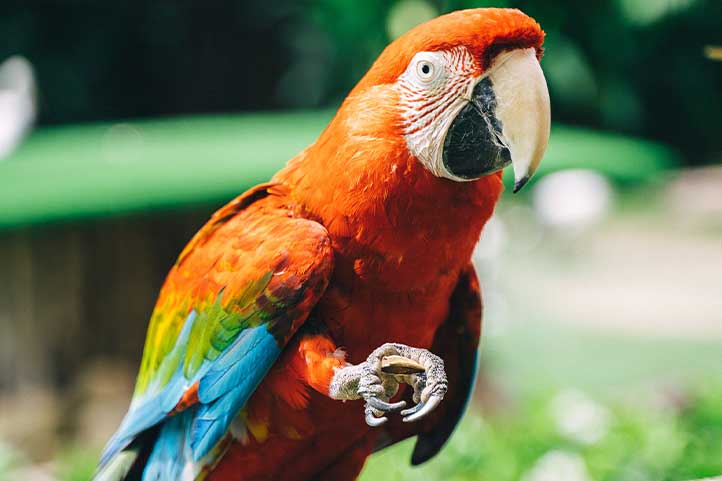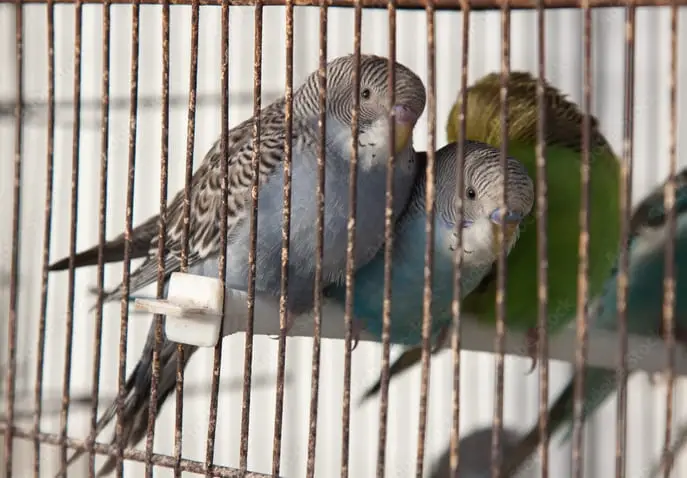Translated by Nick R
Curious questions like this one come up all the time around pet birds, prompt questions that would suggest we should constantly inform ourselves to deal with different situations in the domestication of our winged friends. Here’s what you need to know about sleeping with your canary:
Table of Contents
Can I sleep with my canary?
Canaries are one of the most recommended and common birds to have as pets, they are relatively inexpensive and easy to care for, besides being very docile, sociable and of course, sing beautifully.
Despite how wonderful they are and how much we love our little winged friends, the care of our canaries and ourselves must be taken into account. Some recommendations about our health are good for you to know so you don’t have problems in the future.
The short answer is NO, you must not sleep in the same room with your canary because it is not good for him or for you. There are two main reasons, read on.
Sleeping with your canary is not good for him
Canaries are small birds, you could easily accommodate them in a small or medium size cage and maybe, think it would be a good idea to keep them inside your room. Yet, this practice is harmful to the bird’s health and well-being.
Subjecting your friend to confinement is an outrage against his health; they are very active animals and have natural needs that demand space. Remember that canaries tend to suffer from stress if not offered the ideal conditions to live in captivity, reducing their energy for singing and life expectancy.
For this reason, set up a place for your bird where it can enjoy sunlight and fresh air (beware of drafts), in an enriched and spacious environment with the freedom to leave the cage regularly (patio, terrace, living room, etc.), which will be good for its physical and mental condition.
Important
The place you assign to your friend must be under your control because the bird could escape or suffer an accident, so, if you are not prepared to do it, train your bird before.
Sleeping with your canary can get you sick
That’s right, sleeping with any species of bird and especially with your canary can cause harm to your health as well, due to the pulmonary affectations you can suffer. The main disease you can develop from sleeping with your canary in the bedroom is emphysema (more on this later).
Birds are feathered animals that suffer the fall of their feathers just like any mammal who loses its hair daily in small quantities. In addition, you must take into account that, in the molting season, whether a feathered or furry animal, the number of feathers and hair that fall out increases; a natural and inevitable phenomenon.
Canaries, as feathered animals, molt their feathers and suffer spontaneous shedding. In addition, feathers can also fly into the air when they groom themselves, as well as other smaller particles such as fluff and other organic debris resulting from this common bird behavior.
The point is that you can inhale these particles at night and they could affect your lungs in the long run, especially when you already have a medical diagnosis of respiratory problems such as rhinitis, asthma, and allergies, among others.
-Okay. Well, I can inhale these particles all the time, whether in the bedroom or in the living room,” you would say.
-Yes, maybe,” I would say.
Fair point: the issue is that you are not unconscious (asleep) in the living room or other places for about 6 or 8 hours a day and for more than 360 days a year, totally still while breathing deeply (and snoring) in an enclosed space with a canary that spends its time grooming almost on top of you (especially at night). Do you get me?
On the other hand, cleaning and prolonged contact with birds can also cause other diseases such as hypersensitivity pneumonitis.
What is emphysema?
Emphysema is a chronic obstructive pulmonary disease (COPD) that includes other diseases such as chronic bronchitis. Emphysema is mainly caused by smoking and by exposure to other inhaled irritants such as chemicals, pollution or similar elements in the air that may obstruct the airways and affect the alveoli, the basic functional units of the lungs.
The alveoli are small sacs that inflate when you inhale air and deflate when you exhale as you breathe. When you suffer from COPD, these sacs become deformed because the walls between them are damaged, causing the alveoli to become flaccid and lose elasticity. The destruction of these walls decreases the number of sacs and, therefore, the lungs lose their ability to absorb oxygen and expel carbon dioxide (CO2).
Symptoms
- Cough.
- Fever.
- General malaise.
- weight loss
- shortness of breath
What is pneumonitis?
Pneumonitis is caused by people’s previous or developing hypersensitivity to places with high levels of dust, small organic particles, fungi, and bacteria, among others. Prolonged exposure can lead to lung inflation and acute lung disease.
Imagine what a harmful effect it would have to keep your bird in the room.
Hypersensitivity can be caused by exposure to infectious agents present in objects such as humidifiers, heating and air conditioning systems, as well as bird feathers and feces.
Most often, hypersensitivity pneumonia causes a pneumopathy that affects exclusively bird breeders or owners, commonly called the poultry breeder’s lung. Specifically, the person gets sick because he/she inhales the proteins derived from the birds’ organism for a long time, generating the following symptoms:
Symptoms
- Chills.
- Cough.
- Fever.
- Chest tightness.
- weakness
- Lack of appetite.
I hope it has become clear to you that as much as we love our pets, it is better to give them their space and take care of them as much as we take care of ourselves. See you in a future article.
You may also be interested in
Most common diseases in birds


